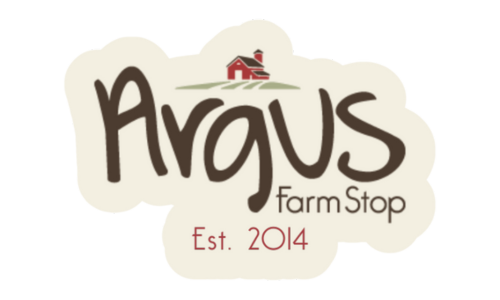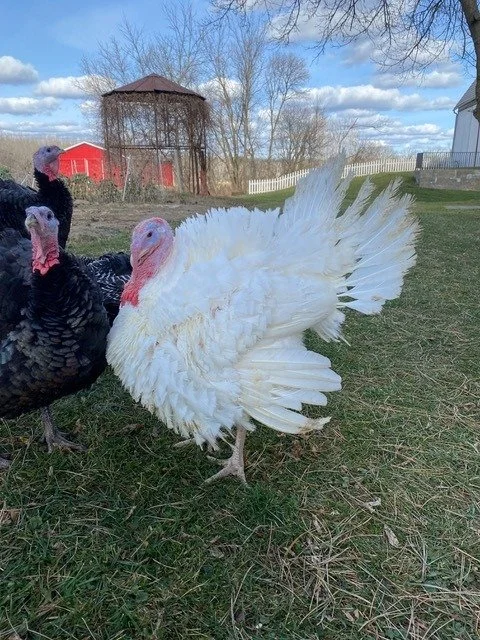Why You Should Purchase A Local Turkey This Thanksgiving: Webbed Foot Pines
Happy Turkey Season! As we prepare to gather our friends and families around a table full of fresh food, we spend a lot of time preparing for the traditional centerpiece of Thanksgiving; Turkey. Instead of buying your turkey from the supermarket, consider buying from one of our local farmers at Argus Farm Stop. Local birds are grown ethically and with careful consideration for what will create the highest quality. To learn more about what goes into local turkey raising, Alex Blume and I recently spoke with Lucas Dickerson of Webbed Foot Pines about his turkey growing practices, and why his turkeys are some of the best you can buy for this upcoming holiday.
Lucas Dickerson knew he wanted to run his own bird farm from a young age. At the age of just nine years old, he told his mom and dad “I’m going to find a way to make a living raising ducks.” While his farm is much more diverse than that now, he “feels [he’s] come pretty close” to that original vision. That vision has turned his passion into Webbed Food Pines Farm, which he runs alongside his children.
Lucas has been a mainstay here at Argus Farm Stop, first selling with us in 2015, after we’d been open for only a year. He’s operated his farm for much longer though, starting his farm as an LLC in 2001. Back then, it was a hobby hatchery farm, but he soon realized his greatest interest was in raising the birds himself, and it’s taken a lot of experience to get to where he is now.
“Back then, I had 45 different kinds of ducks and geese, and I was shipping day-old ducks and geese all over the country of each individual breed. I did that for a few years, but that just wasn’t me. My dad was a traditional farmer—grain, crops, beef cattle, a few hogs, and a few chickens. My grandpas on both sides farmed. My grandpa Dickerson lived on their farm—165 acres—he fed and raised their kids. They had a huge orchard. My grandpa on the other side was a farmer as well—grain crops.”
Lucas is most known for his birds; ducks, chickens, geese, but he also raises beef and pork. Of course, he also raises turkeys, with the majority of his turkeys intended for Thanksgiving orders. Turkey raising has been a part of Lucas’ life since he was a teenager.
“Before I could drive, I was raising turkeys. I have a few fond memories from when I was a teenager, and my parents were driving me around to deliver turkeys to my customers. We’ve been doing this for a long time, but I’ve refined it a lot more now into what we do for our Thanksgiving turkeys.”
Lucas took this wealth of knowledge and experience he’d been immersed in since childhood and applied it to his own interests in hatching and raising birds. He now offers a wide range of items, including chicken, duck, quail, turkey, and goose eggs and meat. Turkeys can be found across a large variety of stores throughout the nation leading up to the end of November. What are the benefits to buying a local turkey instead of the turkeys you can find at your local grocery store or supermarket. Lucas enlightened us on what it takes to grow these birds, and why he recommends buying a locally raised turkey for Thanksgiving.
”We strictly do fresh, never frozen turkey or duck for Thanksgiving. There’s a lot behind raising turkeys. I order my turkey poults typically in January or February for the year, and then these turkeys that we have for fresh, never frozen for Thanksgiving, those poults get started at the end of July or start of August. So, they’re actually not very old, but if you don’t order them early enough, you don’t get the date you want or the sex you want.”
There is a lot more care and consideration that goes into raising each turkey at a local farm compared to how they might be grown at large, more industrial farms. While industrial farming will confine turkeys to small quarters, crowded with hundreds if not thousands of other turkeys, feeding them strictly on grain, local turkey farming encourages the turkeys to live lives similar to how they would in the wild.
“Our turkeys are all pasture raised. We let them out during the day, so they’re allowed to forage on pasture and grass for bugs, snails, slugs, or anything they can find—they’ll eat it. We bring them back in at night for non-GMO feed, and lock them up to keep them safe from predators.”
One concern shoppers have these days when it comes to buying food with better growing practices, like organic grown or locally grown, is the price. Local turkeys can often end up a little pricier than the turkeys offered in major grocers. Why is it that local grocery stores are able to offer turkeys at a lower price than local farmers? Part of the reason is that many grocery stores will price turkeys as a “loss leader”. The turkeys will be sold for a price lower than the cost of the turkey, increasing demand. At supermarkets, where many products are for sale at one location, the loss at the turkey sale is made up for by the other products people will buy in one visit.
This leaves farmers out in the cold. We are not paying a price that values their labor, and devalues any cost added growing practices like using non-GMO feed, pasture raising, and more. But the incentive of paying for a local turkey isn’t just in the value of the labor practices, it’s also in the quality of the bird you get.
“For me, it’s the fresh, never frozen turkey. Many supermarket turkeys are not always fresh, never frozen. Some of them are, but the turkeys that you’ll get from Webbed Foot Pines for Thanksgiving will be less than ten days fresh, so about as fresh as they come.”
When you buy a loss-leading turkey at the supermarket, farmers don’t choose the prices at which their products are sold. They sell their turkeys to the market at a wholesale price, a relationship where the leverage often lies with the supermarket and not the farmer. Farmers receive on average 15 cents on the dollar for what we pay at the supermarket. Shopping through local channels, and through Argus Farm Stop, flips this paradigm on its head. Farmers choose their own prices and receive 70% of each sale at Argus Farm Stop. We have seen the literal impacts of these higher margins affect farmers directly in South East Michigan. Lucas discussed the impact this has on his ability to operate the farm.
“That [percentage] allows us to make improvements on our farm. It allows me to be self-employed on my farm, with no other income in our household, going on year eighteen now. It allows me to do that without working another job. At a lot of other places, you’re going to have to do that, but this allows us to continue to build and make improvements on the farm as we go.”
Part of those improvements at Webbed Foot Pines has been experimenting with heritage breed turkeys. Heritage breed turkeys are far rarer than most turkey breeds. They differ greatly from the turkeys that are bred and raised on industrial farms, again allowing the turkeys to live a life more representative of their wild counterparts.
“Heritage breed is more of an old school breed. A lot of them are non-existent, or very few are around. They don’t have the massive bodies or huge breasts like the large turkeys you see typically nowadays. They’re a much smaller bird, and most will reproduce themselves, whereas the commercial lines will not do that. I’m actually dabbling with a small line of some Beltsville Small Whites—I have a couple pairs at home I’m actually going to try to hatch and produce on my own.”
Bird farming usually involves ordering the hatchlings from hatcheries in the mail. Webbed Foot Pines is unique in that Lucas and his family hatch a large variety of their own birds, including the heritage breed turkeys.
“We hatch a lot of our own poultry and water fowl—ducks, geese, chickens, turkeys. We have incubators in the basement and have the capacity to hatch large numbers. I can run about 1600 eggs at full capacity in our basement right now.”
Lucas has dedicated his life to what he loves, and his passion comes through clearly in his work and the wonderful quality of the birds and eggs he supplies Argus Farm Stop with.
If you’re wondering where you can find some of Lucas’s delicious turkeys for Thanksgiving, there are a variety of avenues you can go through.
“The best and the easiest place is Argus Farm Stop. We deliver the turkeys roughly about a week before Thanksgiving, so you have time to pick them up here. If it doesn’t work for where you’re at locally, you’re welcome to give me a call or drop me a text or an email to Webbed Foot Pines, and I do offer delivery to the outer area.”
You can pre-order Lucas’s turkeys or ducks here along with Argus Farm Stop’s curated Thanksgiving Produce Box, locally baked pies, and more.
We at Argus Farm Stop are so appreciative of our relationship with Lucas and all of our wonderful farmers. It’s been a joy to work with Webbed Foot Pines for an entire decade. We hope you will get to enjoy a local turkey this Thanksgiving!




